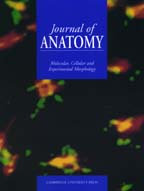Article contents
Characterisation of glycoconjugate sugar residues in the vomeronasal organ of the armadillo Chaetophractus villosus (Mammalia, xenarthra)
Published online by Cambridge University Press: 01 April 2000
Abstract
Conventional carbohydrate histochemistry and the binding patterns of 21 lectins were analysed to characterise the glycoconjugate content in the components of the vomeronasal organ of the armadillo Chaetophractus villosus. The mucomicrovillous complex of the sensory epithelium bound most of the lectins studied. No reaction was observed with Con A, PSA, S-Con A and SBA, and the sustentacular cells were stained with UEA-I, DSL, LEL, STL and Con A. The vomeronasal receptor neurons were labelled with S-WGA, WGA, PNA, UEA-I, STL, Con A, S-Con A, ECL and RCA120. The basal cell layer reacted with S-WGA, WGA, LCA, UEA-I, DSL, LEL, STL, Con A, JAC and VVA. The nonsensory epithelium exhibited a differential staining in relation to the different components. The mucociliary complex stained with ECL, DBA, JAC, RCA120, STL, LCA, PHA-E, PHA-L, LEL, BSL-I and VVA. However, SJA and UEA-I stained the mucus complex lining a subpopulation of columnar cells. The cytoplasm and cell membranes of columnar cells was labelled with DBA, DSL and LCA. The apical region of these cells exhibited moderate reactivity with LEL and SJA. None of the lectins bound specifically to secretory granules of the nonsecretory cells. Basal cells of the nonsensory epithelium were labelled with DSL, LEL, LCA, BSL- I and STL. The vomeronasal glands showed a positive reaction with WGA, DSL, LEL, LCA, DBA, PNA, RCA120 and SBA. Subpopulations of acinar cells were observed with ECL, S-WGA, Con A, S-Con A and DBA. PNA and RCA120 stained the cells lining the glandular ducts. In comparison with previous results obtained in the olfactory mucosa of the same group of armadillos, the carbohydrate composition of the vomeronasal organ sensory epithelium differed from the olfactory sensory epithelium. This is probably related to the different nature of molecules involved in the perireceptor processes.
- Type
- Research Article
- Information
- Copyright
- © Anatomical Society of Great Britain and Ireland 2000
- 11
- Cited by


